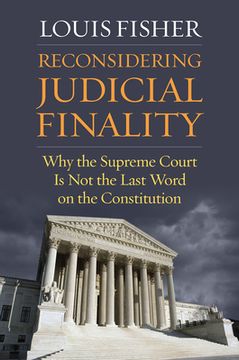Reconsidering Judicial Finality: Why the Supreme Court Is Not the Last Word on the Constitution (in English)
Synopsis "Reconsidering Judicial Finality: Why the Supreme Court Is Not the Last Word on the Constitution (in English)"
Federal judges, legal scholars, pundits, and reporters frequently describe the Supreme Court as the final word on the meaning of the Constitution. The historical record presents an entirely different picture. A close and revealing reading of that record, from 1789 to the present day, Reconsidering Judicial Finality reminds us of the "unalterable fact," as Chief Justice Rehnquist once remarked, "that our judicial system, like the human beings who administer it, is fallible." And a Court inevitably prone to miscalculation and error, as this book clearly demonstrates, cannot have the incontrovertible last word on constitutional questions.In this deeply researched, sharply reasoned work of legal myth-busting, constitutional scholar Louis Fisher explains how constitutional disputes are settled by all three branches of government, and by the general public, with the Supreme Court often playing a secondary role. The Court's decisions have, of course, been challenged and reversed in numerous cases--involving slavery, civil rights, child labor legislation, Japanese internment during World War II, abortion, and religious liberty. What Fisher shows us on a case-by-case basis is how the elected branches, scholars, and American public regularly press policies contrary to Court rulings--and regularly prevail, although the process might sometimes take decades. From the common misreading of Marbury v. Madison, to the mistaken understanding of the Supreme Court as the trusted guardian of individual rights, to the questionable assumptions of the Court's decision in Citizens United, Fisher's work charts the distance and the difference between the Court as the ultimate arbiter in constitutional matters and the judgment of history.The verdict of Reconsidering Judicial Finality is clear: to treat the Supreme Court's nine justices as democracy's last hope or as dangerous activists undermining democracy is to vest them with undue significance. The Constitution belongs to all three branches of government--and, finally, to the American people.

